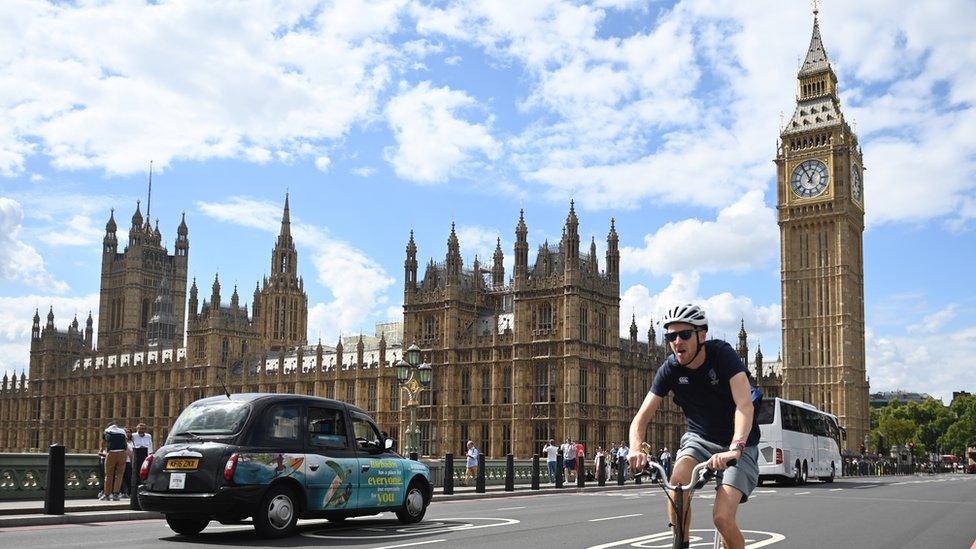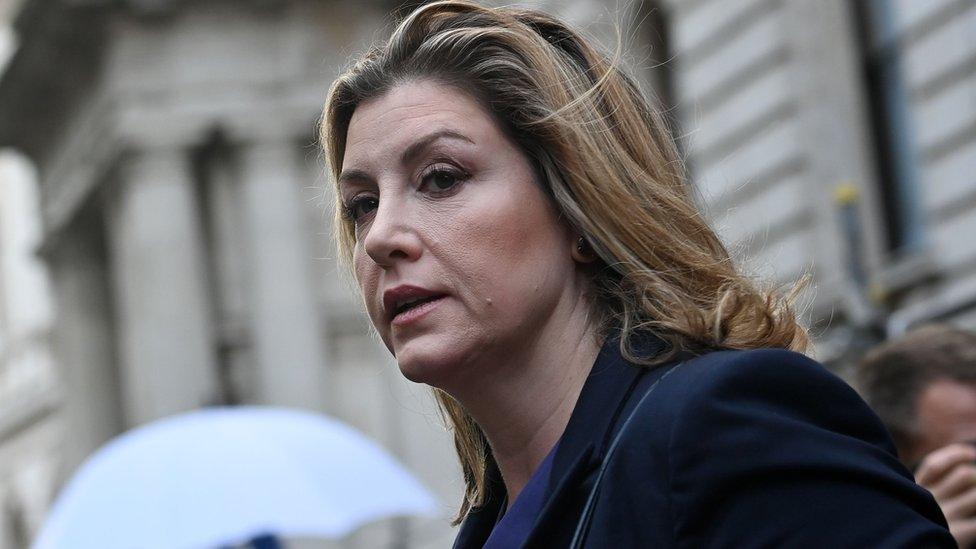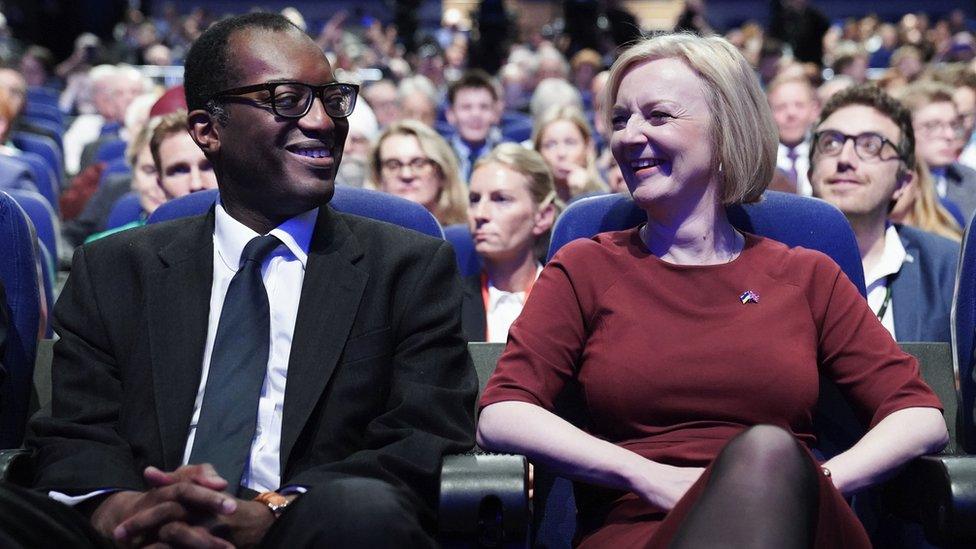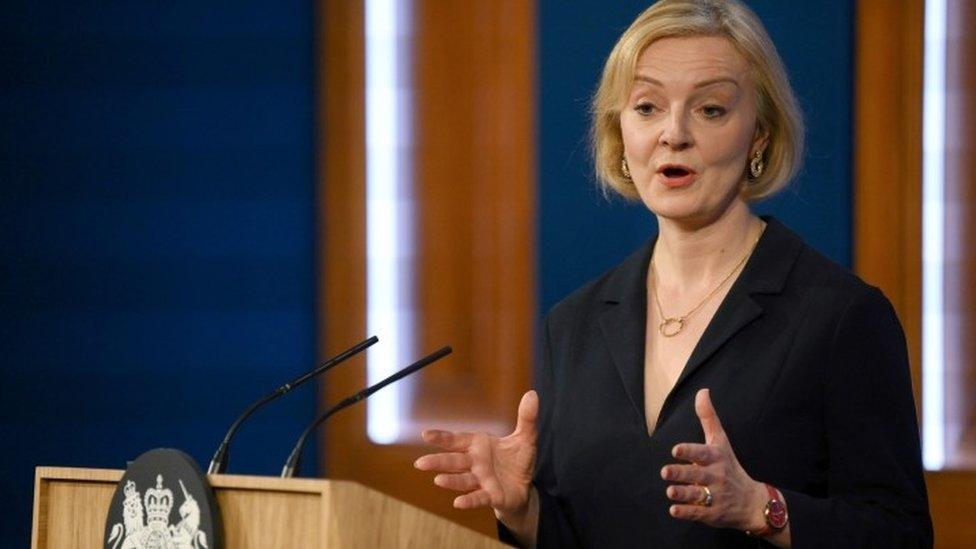What's happening in Parliament next week?
- Published

A period of calm ahead? After a fortnight of concentrated political drama the agenda for the coming week is crammed with worthy legislation to sooth the jangled nerves of our parliamentarians.
It won't now be the week of a mini-budget or autumn statement. Jeremy Hunt's planned market-steadying financial package is postponed to 17 November - as was always likely - while the new prime minister vets it.
So expect question times to be dominated by speculation about its content. What cuts are on, and off the Treasury table?
They'll be big with a fiscal black hole estimated at £50bn plus. The expectation is that both current spending and promised increases will face the axe - getting to 3% of GDP on defence looks a distant dream, for example.
Eyes will be peeled for further turmoil on the Tory benches. There was a brief kerfuffle this week when the Commons Leader Penny Mordaunt didn't turn up at the normal time to announce the forthcoming agenda, resulting in an unusual hour long suspension of the Commons.
It turned out the hiatus was caused by a clash between her duties as Leader of the House of Commons and as Lord President of the Council. She was busy swearing-in new ministers to the Privy Council in the presence of the King.
This was an unavoidable clash between the royal diary and the parliamentary diary; irresistible force meets immovable object.
That's unlikely to recur, but it was a rather untidy moment. The nervous twitch with which many greeted the incident was telling evidence of continuing political jumpiness.

Leader of the House Penny Mordaunt missed Business Questions this week due to a diary clash
Meanwhile, there's more churn on the committee corridor, after the string of government reshuffles caused vacancies for the chairs of the Health, Treasury, Education and Transport committees.
Jeremy Hunt, Mel Stride, Robert Halfon and Huw Merriman are now all ministers. All four chairs are reserved for Conservative MPs, under the share-out agreed by the parties.
So far, former health minister Steve Brine and Anne Marie Morris have been nominated for health - with other contenders collecting signatures.
John Baron and committee member Harriet Baldwin have been nominated for Treasury. Former cabinet ministers Andrea Leadsom and Kit Malthouse are mulling a run for the job, and so is former health secretary Matt Hancock
It is early days yet for education and transport committee - but expect some serious contenders. Former South West Trains executive and 2019-intake Tory MP Chris Loader is already being mentioned for the latter.
And remember, when there are several Conservative contenders, opposition votes are decisive - as they were in the recent election to replace Tom Tugendhat as chair of Foreign Affairs Committee, where Alicia Kearns defeated several more famous names. They tend to go for the candidate they a) hate least and b) think will cause the most trouble for the government.
As one Labour figure said about the emerging race for Treasury Chair, "we're looking to see who the Alicia Kearns figure will be."
Monday 31 October
Commons: at 14.30 GMT Work and Pensions questions, with new Secretary of State Mel Stride. Then expect the usual post-weekend government statements and urgent questions.
Mr Speaker is also due to receive the Serjeant at Arms report on allegations of bullying and manhandling during the fracking vote on 12 October. The Speaker may want to mull its contents before delivering a verdict, but keep an eye on that issue.
Then it's the Report Stage and Third Reading of the Genetic Technology (Precision Breeding) bill - which changes the definition of Genetically Modified Organisms in England to exclude those created by gene editing in ways which could have occurred naturally or been produced by traditional breeding.
Consideration of Lords amendments to the Product Security and Telecommunications Infrastructure bill will then be considered. The bill supports the rollout of future-proof, gigabit-capable broadband and 5G networks, and improves the safety of networks and infrastructure.
Westminster Hall: MPs debate e-petition 608056, which calls for the renationalisation of much of the energy industry. It attracted 109,310 signatures.
Committees: at 16.00 the Public Accounts Committee quizzes officials from Sport England and the Department for Digital, Culture, Media and Sport on grassroots participation in sport.
Lords: at 14.30 Northern Ireland Protocol Bill - Committee will have its second day of debate. The final committee day is scheduled for 7 November.
There's also a short debate on plans to review the powers and functions of Police and Crime Commissioners.
Tuesday 1 November
Commons: at 11.30 Health questions begins, starring new the Secretary of State Stephen Barclay .
Labour's Siobhain McDonagh has a Ten Minute Rule Bill, calling for broadband connections to be provided to households where there are children on free school meals.
The its the Second Reading of the UK Infrastructure Bank Bill which will lend directly to local authorities to fund infrastructure projects
Westminster Hall: Conservative Jack Brereton has a debate at 11.00 calling for the reclassification of the psychoactive drug monkey dust. He he says the drugs is now cheaply available on the streets of his home city, Stoke-on-Trent. It causes extremely violent or zombie like behaviour in users, so he wants it reclassified from a class B to a class A drug, to increase the penalties on dealers.
Labour's Beth Winter then leads a debate at 14.30 impending public sector pay strikes. At 16.30 Conservative Nickie Aiken continues her campaign on the employment rights of people undergoing fertility treatment.
Committees: Health and Social Care Committee meet at 09.50 to question the former chief inspector of hospitals, Dr Ted Baker. Dr Baker is the government's preferred candidate for the important new role of chair of the new Health Services Safety Investigations Body investigate patient safety incidents in England.
Foreign Affairs Committee meet at 14.30 to continues its inquiry into the shadowy Russian mercenary organisation, the Wagner Group. Witnesses include Russian pro-democracy activist and former political prisoner Mikhail Khodorkovsky.
Lords: at 11:30 the Public Order Bill has its Second Reading. This is the new suite of powers to control demonstrations which peers last year refused to allow the government to add to the Police, Crime Sentencing and Courts Bill.
Expect a lot of amendments at the later Report Stage, and possibly an extended "ping-pong" with the Commons, to resolve disagreements about the bill.
Wednesday 2 November
Commons: at 11:30 it is questions to the President of COP 26, Alok Sharma, who now no longer attends cabinet. His role expires at the next conference, in Cairo, which starts this week.
Prime Minister's Questions follows at Noon.
Then there's a Ten Minute Rule Bill by Conservative Alberto Costa, who wants to make it compulsory for washing machines to have built-in filters to curb microplastic pollution.
The Scottish National Party then have an Opposition Day Debate on a subject yet to be announced
Labour's Bell Ribiero Addy at 0930 leads a debate on Black Maternal Health Awareness in Westminster Hall. Conservative Matt Warman 14.30 has a debate on visas for international doctors - more than 40% of all GP trainees are international medical graduates but have difficulties obtaining visas.
Committees: at 09.45 the Home Affairs Committee quizzes the Police Foundation, the National Police Chiefs' Council and Police and Crime Commissioners on policing priorities. At 14.15 the Treasury Committee hears from personal finance experts on the mortgage market.
The Defence Committee meets at 14.40 to question Defence Secretary Ben Wallace, in the final session in its inquiry into co-operation between the US, UK and NATO.
Lords: at 15.00 the Northern Ireland Protocol Bill has its third day of Committee stage analysis.
Thursday 3 November
Commons: at 09.30 it is International Trade questions.
Then there are a series of backbench debates. First on the independent Khan review of Smokefree 2030 policies, the motion calls on the government to implement its proposals to make smoking "obsolete".
That's followed by a debate on the government's White Paper 'A Fairer Private Rented Sector'.
Lords: at 11.00 peers debate on stability in the financial markets, on the decision of ambulance workers across 11 trusts to ballot for strike action.
Then there's debate on the future of public service broadcasting, in the year of the BBC's centenary.
Neither House sits on Friday.
Related topics
- Published14 October 2022
- Published14 October 2022

- Published14 October 2022

